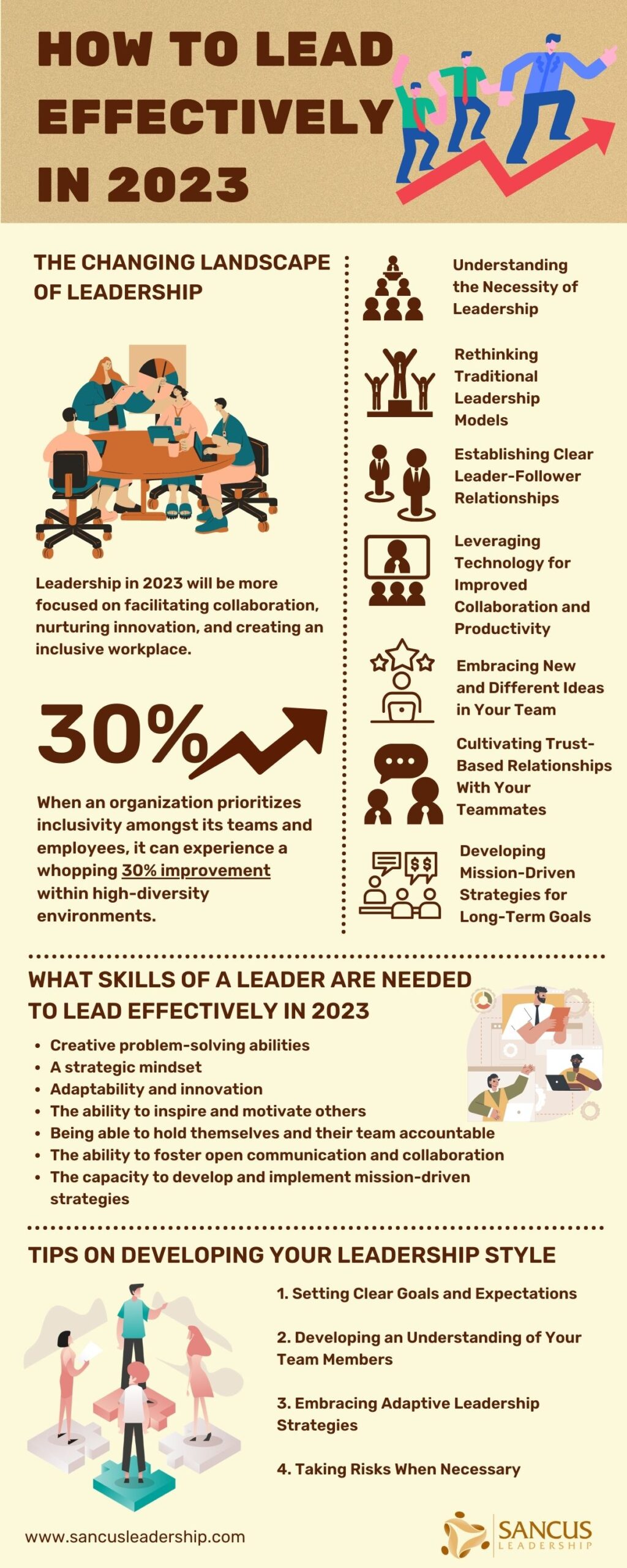The business world is ever-evolving, and the skills needed for successful leadership roles are no exception. For small teams, effective management and leadership have never been more critical. As the business environment changes and evolves, specific skills will help ensure your team is well-positioned to succeed.
To lead effectively in 2023 and beyond, leaders need to understand their team members and individual goals. Taking the time to get to know each team member and their unique strengths and weaknesses is vital in learning to tailor leadership approaches that will bring out their best.
This blog post outlines the changing landscape of leadership in 2023. It provides insights into what skills are needed to lead effectively. From developing leadership skills for tomorrow’s leaders to embracing diversity and inclusiveness in your team, this post will guide you through the critical elements of effective modern leadership.
The Changing Landscape of Leadership in 2023

Leadership in 2023 will be more focused on facilitating collaboration, nurturing innovation, and creating an inclusive workplace.
Leaders will need to possess strong communication and collaboration skills, as well as an understanding of how to leverage technology to improve the performance of their teams.
Leaders must also understand the importance of creating a diverse and inclusive workplace, promoting team trust, and motivating their staff to achieve maximum productivity.

Understanding the Necessity of Leadership
In today’s ever-evolving business landscape, leaders must be proactive and up-to-date on strategies that pave the way to success. Effective leadership is essential for businesses to reach their goals in 2023. It involves:
- Planning
- Having a clear vision of what the team needs to accomplish
- Communicating that message to the team
Leaders must be able to motivate their team and make sure everyone feels heard and valued.
Leaders must be able to motivate their team and make sure everyone feels heard and valued.
Additionally, they need to stay focused on the team goal and provide necessary resources or adjustments when needed along the way. It takes courage and commitment, but if done successfully, leadership can unleash great potential in any organization.
Rethinking Traditional Leadership Models
We must reconsider traditional leadership models for effectiveness to stay ahead in the 2023 business world. Leaders must be more innovative and creative than ever before, developing leadership philosophies that can grow and evolve with their teams.
With the many changes in workplace policies, lifestyle trends, technology advancements, and economic uncertainty from the pandemic, being able to quickly anticipate and prepare for new situations is an essential quality of great leaders.
A leader must be versatile to stay on top of things, so approach leadership with an open mind.
Establishing Clear Leader-Follower Relationships
Establishing leader-follower relationships in 2023 will look slightly different than in the past. As a leader, you must ensure that:
- Team goals and expectations are laid out from the start
- You provide explicit instructions and be open to input from your followers
It would be best to focus on creating a trusting and respectful environment to create strong relationships. Transparency is critical — by regularly sharing information and updates with your followers, you can maintain a sense of openness and nurture their self-confidence. Only then can these relationships flourish.
Leveraging Technology for Improved Collaboration and Productivity
The use of technology in the workplace is essential for improved collaboration and productivity. From virtual meetings to data-driven insights, new technologies, and software make it easier for leaders to bring their teams together and maximize performance.
Leaders must be able to keep up with the ever-changing technology landscape. Influential leaders should be:
- Familiar with the latest tools and software
- Understand how to use them properly
- Be able to train their staff on these tools
To take full advantage of technological advances in the workplace, leaders must dedicate themselves to upskilling their teams and staying informed on the most effective technologies.
Embracing New and Different Ideas in Your Team
As a leader in 2023, you must be committed to creating an environment where everyone is respected and valued. By promoting diversity of perspective, you can leverage the unique abilities of each person on your team.
Leaders must also recognize that diverse teams are more successful. When an organization prioritizes inclusivity amongst its teams and employees, it can experience a whopping 30% improvement within high-diversity environments. Not only that, but this form of team optimization also unlocks numerous other benefits related to workplace diversity.
By understanding and celebrating the differences of each individual, you can foster an environment of collaboration and creativity. This environment will help your team achieve success in ways you never thought possible.
Cultivating Trust-Based Relationships With Your Teammates
To build a strong team in 2023, leaders must develop trust-based relationships. Research has shown that teammates who trust each other are:
- More productive by 50%
- Work 106% better together with higher levels of performance
- Take 13% less sick leave
- Reduce burnout by up to 40%
Leaders must put in the effort to foster trust amongst their team members. They can achieve this using the following tips.
- Creating an open communication line
- Encouraging collaboration
- Being consistent with feedback
- Offering support and recognition
- Providing transparency
Developing Mission-Driven Strategies for Long-Term Goals
In an ever-changing world, leaders must be strategic to set their teams up for long-term success. To do this, leaders must develop mission-driven strategies that outline the team’s purpose and direction.
By taking a proactive approach to strategic planning, leaders can identify long-term goals and ensure that all team members work towards the same outcome. This will also help create a sense of unity and purpose amongst the team.
| Key Points | Implications for Leadership |
| Understanding the Necessity of Leadership | Proactive leaders must be proactive, motivate their team, and ensure everyone feels heard and valued. |
| Rethinking Traditional Leadership Models | Versatile leaders must be versatile, adaptable, and open-minded to anticipate and prepare for new situations. |
| Establishing Clear Leader-Follower Relationships | Transparent leaders should set team goals, provide explicit instructions, and create a trusting and respectful environment. |
| Leveraging Technology for Improved Collaboration and Productivity | Leaders should embrace technology to enhance collaboration and productivity and upskill their teams accordingly. |
| Embracing New and Different Ideas in Your Team | Leaders should promote diversity and respect, and value each team member’s unique abilities for collaboration and creativity. |
| Cultivating Trust-Based Relationships With Your Teammates | Leaders must foster trust among team members to build a strong team in 2023. |
| Developing Mission-Driven Strategies for Long-Term Goals | Leaders must develop mission-driven strategies to set long-term goals and create a sense of unity and purpose among the team. |
What Skills of a Leader Are Needed to Lead Effectively in 2023

The skills of a leader are constantly changing and evolving. Great leaders have various skills, but in 2023, the ability to navigate through rapid change and uncertainty is paramount. Leaders must also be able to apply creative solutions and manage diverse workforces.
In addition to being able to remain calm under pressure, leaders must possess the following skills.
- Creative problem-solving abilities
- A strategic mindset
- Adaptability and innovation
- The ability to inspire and motivate others
- Being able to hold themselves and their team accountable
- The ability to foster open communication and collaboration
- The capacity to develop and implement mission-driven strategies
Developing Leadership Skills for Tomorrow’s Leaders
Leadership must evolve with the times. Leaders in 2023 must be dynamic, forward-thinking, and able to take risks when necessary. By embracing the following strategies, leaders in 2023 can ensure they have the skills needed to lead successful teams.
- Stay informed on the latest trends and industry news
- Develop strategic plans that promote innovation
- Encourage diversity and inclusivity amongst your team members
- Cultivate trust-based relationships
- Be an adaptive leader who is open to change
- Empower and motivate your team members
- Practice emotional intelligence
- Foster an environment of collaboration and mutual respect
Leaders have the potential to make a difference in their teams. By embracing the strategies outlined above, leaders in 2023 can set their teams up for success and foster an environment of innovation.
Adaptive Leadership: Strategies for Successful Team Building
Adaptive leadership is more critical than ever in the modern business world. In 2023, adaptive leaders will lead successful teams who can navigate rapid change and uncertainty gracefully and confidently.
In 2023, adaptive leaders will lead successful teams who can navigate rapid change and uncertainty gracefully and confidently.
Leaders must take a proactive approach to team building, creating an environment of trust, openness, and collaboration. They must also develop mission-driven strategies that combine their team members’ talents to reach long-term goals.
Adaptive leaders must also strive to stay informed on the latest trends and industry news and practice emotional intelligence to motivate and inspire their teams.
Creating a Culture of Support and Recognition
Leaders are instrumental in fostering a culture of appreciation and recognition, where each team member’s effort is valued. By showing gratitude for the contributions made by all members, you can cultivate an environment that promotes individual growth and celebrates accomplishments.
Leaders should also provide feedback on time and prioritize offering support to their team members when needed.
When a leader decides to invest in the development of their team, they foster an atmosphere of improvement and success while retaining their most valuable staff.
You can do this by providing learning and development opportunities and encouraging your team members to pursue their interests outside work. As a leader, you must understand that creating a positive culture takes time but will pay off in the long run.
The Importance of Emotional Intelligence in Modern Leadership
Emotional intelligence (EQ) is crucial for success in the contemporary business world. You must be self-aware and empathetic, understanding the needs of your team. Improving EQ can help leaders achieve the following.
- Create a culture of trust
- Motivate their teams
- Foster open communication
Understanding emotional intelligence is essential for creating strong teams and wise leaders. Leaders who sense their team’s needs are more efficient in making decisions that align with the common goal, building a stronger foundation to succeed further down the road.
Tips on Developing Your Leadership Style

Larry Page, the co-founder of Google, emphasized that “Always deliver more than expected” to remind us how influential leadership can be when forming victorious teams.
This statement is further supported by research that suggests the most successful teams are those with engaged and supportive leaders. Leaders can develop their leadership style in several ways, including the following.
1. Setting Clear Goals and Expectations
Effective leadership requires setting clear goals and expectations to motivate and empower your team. By creating achievable objectives, your team can take pride in their successes and build strong working relationships.
Being transparent and exhibiting trust through clearly defined expectations engenders a sense of confidence within the group that helps the entire organization move forward.
Arming yourself with effective goal-setting tactics is essential to inspiring and motivating everyone in the organization.
2. Developing an Understanding of Your Team Members
Successful team building and leadership requires understanding your team member’s strengths, weaknesses, goals, and interests. You can achieve this by:
- Asking questions to get to know each person individually
- Understanding their perspectives
- Listening carefully to their thoughts and ideas
Gallup’s research reveals that individuals become 7.8% more productive when recognizing their strengths and weaknesses. Leaders who take the time to assess individual team members’ skills can assign tasks that maximize everyone’s potential while being flexible with their leadership style.
3. Embracing Adaptive Leadership Strategies
Adaptive, dynamic leaders lead successful teams who understand that situations can change at any moment and are prepared to respond accordingly. Leaders should be open to input from their team and confident to pivot when needed. This strategy could involve the following:
- Experimenting with different approaches
- Learning from mistakes
- Considering new ideas to reach the desired outcome
Adaptive leadership strategies are essential to sustaining a flexible and innovative team culture. This environment can be achieved by:
- Empowering your team
- Practicing active listening
- Encouraging creative problem-solving
Creating a culture of support and recognition is also essential to foster motivation among the team. Leaders should recognize their team members’ successes, which they can do through public praise or private acknowledgments.
4. Taking Risks When Necessary
Taking calculated risks is an essential trait of a successful leader. Making decisions with courage while taking into account the perspectives of others, risk-taking leaders recognize that they have to be brave sometimes to reach their objectives most efficiently.
Thankfully, studies indicate that this confidence and decisiveness are appreciated by colleagues, whether or not it leads to productive outcomes. Don’t hesitate when challenging situations arise — demonstrate bravery and seize the opportunity!
Thankfully, studies indicate that this confidence and decisiveness are appreciated by colleagues, whether or not it leads to productive outcomes.
Have confidence in your and your colleagues’ abilities, and face the possibility of failure with optimism. Leveraging experience and insight are vital components of any great leader; show strength when making tough calls.
| Tip | Summary |
| 1. Setting Clear Goals and Expectations | Leaders should set clear goals and expectations to motivate and empower their team, fostering strong working relationships. |
| 2. Developing an Understanding of Your Team Members | Understanding team members’ strengths, weaknesses, goals, and interests allows leaders to assign tasks that maximize potential and adapt leadership styles accordingly. |
| 3. Embracing Adaptive Leadership Strategies | Adaptive leaders are open to input, confident to pivot when needed and create a culture of support and recognition to foster motivation in the team. |
| 4. Taking Risks When Necessary | Successful leaders take calculated risks, make courageous decisions, and consider others’ perspectives to reach objectives efficiently. |
Here’s a talk by Roselinde Torres explaining how one can be a great leader by being aware of modern trends and incorporating them into their work to form a better bond with their team. Great leaders have the courage to be bold and different and willing to leave traditions behind to improve.
Final Thoughts
Leading a successful small team requires building and maintaining an influential, adaptive culture. Putting the suitable systems and processes in place will ensure that:
- Your team meets its objectives
- Everyone is motivated
- Team members feel empowered and engaged
Through clear expectations, positive motivation, creative problem-solving, and risk-taking, you have the tools and resources to lead your team to success.
By managing and leading with these strategies, you can unlock the potential of small teams and create a work environment that is both supportive and productive.


